At Baghdad’s grand but half-empty railway station, a single train is sputtering to life. It is the newly revived daily service to Falluja, Reuters reported.
The tracks running through Anbar province are now clear of mines planted by ISIS and of collapsed bridges which the terrorist group blew up.
After a four-year hiatus, hundreds of rail passengers now travel the 30 miles (50 km) between Baghdad and Falluja in just over an hour.
“The train saves time. The Baghdad-bound leg arrives at 8 a.m., which suits my schedule. It’s also cheaper” than by car at 3,000 Iraqi dinars ($2.50) for a ticket, commuter Thamer Mohammed said.
“I hope the service will keep running, but in the last few days there have been delays. Sometimes it runs out of fuel on the journey, or has technical failures,” Mohammed added.
Abdul Sittar Muhsin, a media official for the national operator Iraqi Republic Railways, said the company was in dire need of funding to keep the service running.
“We did this with the company’s money and we’re operating at a loss,” he said.
Also, a Falluja resident studying for a history doctorate in Baghdad was quoted by Reuters as saying: “You don’t have to stop at checkpoints, and it’s safer. You avoid road accidents.”
Railway officials hope to restore services all the way to the Syrian border.
Iraq’s rail network, developed during the British mandate period and under Baath party rule in the 1960s, used to stretch to Istanbul and Aleppo in Syria via Mosul in northern Iraq.
However, Reuters reported that plans to extend beyond Falluja might be ambitious, with tracks buried in sand and the Iraqi forces have been reinforced at the border after recent ISIS counter-attacks in Syria.









